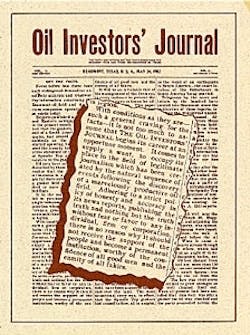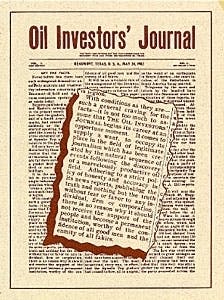How an institution responds to the turn of a millennium
"The Oil and Gas Journal...[will try] to represent fairly and consistently each and every interest involved in the oil and gas industry...by the presentation of all the material facts of development and intelligent progress of a great and international business." - OGJ, June 16, 1910.
So a 98-year-old institution dedicated to a mature industry arrives at the turn of a millennium, when the mood favors change and popular preference defaults to anything new. How does the institution respond?
Oil & Gas Journal responds by welcoming the future, heeding the past, and changing where change makes sense.
In a rapidly moving business world, it's nice to have a past to heed. Experience helps in decisions about which changes to make and which ones to hope others make.
This is one of the advantages of being an institution-and one of the hazards if it makes the institution reluctant to change at all.
Oil and gas?
For example, institutional experience guides OGJ's answer to a change question that emerges now and then: Should the focus shift away from oil and gas?
The question derives partly from voices heralding the end of the Petroleum Age. Depletion of the resource, some say, is at hand. Combustion of fossil energy, others declare, threatens to cook the planet and must be stopped.
As motives to move away from oil and gas, resource depletion and global warming need perspective.
To OGJ, worry about the resource is nothing new. The magazine made its debut in Beaumont, Tex., on May 24, 1902-as The Oil Investors Journal. It was just 16 months after the nearby Spindletop discovery, and the most famous oil executive of the day, John D. Rockefeller, was warning that the world could not make use of all that crude. When the motor vehicle proved him wrong, prophecies of market doom shifted to resource depletion, which seems to have been imminent ever since.
Such prophecies thrive even now. And they deserve the industry's attention-if for no other reason than that they'll be right someday.
Plenty of fluid hydrocarbon remains, nevertheless. And OGJ will continue publishing the best material available about the space-age innovations that keep pushing exhaustion of an undeniably finite resource further into the future than anyone seems able to imagine.
Nor will fear about global warming deter OGJ from its mission as long as fear remains more potent and certain a phenomenon than human warming of the climate. In 98 years, OGJ has seen a number of bogeymonsters come and go and leave no one the worse off except when governments acted fearfully and acted in ways that deprived people of economic energy. What's more, OGJ has developed a passion for science over the years and sees too little attention paid to it in the global warming controversy.
In time, good sense will prevail. Uncertainty about climate mechanics will collide with certainty about the cost of precautions likely to be both ineffective and unnecessary. Global warming prescriptions-inevitably punitive taxes on carbon-if not the clamor for them will fade away, hopefully before they hurt people much.
Petroleum alternatives
This doesn't mean OGJ ignores alternatives to petroleum, of course. Indeed, it covers them enthusiastically because, for OGJ readers, they're important.
The magazine will not, however, bet next year's budget on a major market breakthrough by any of the popular newcomers. When and if such a breakthrough occurs, OGJ will cover it-also enthusiastically. The people of the world need lots of energy in lots of forms.
But an institution cannot have witnessed the boondoggle US Synthetic Fuels Corp., the oil industry's premature forays into shale oil, and the perpetually tiny contribution of popular exotics to the total energy mix without learning something. Energy alternatives have a way of containing more salesmanship than heating value.
Oil and gas, therefore, will remain prominent in OGJ. So will OGJ's commitment to technology, to the efficiency of markets, to the creative power of people, and to the central role of energy in human progress.
Change happens
Other things will and do change, however. Changes in the past decade at OGJ, for example, include a transfer of editorial headquarters from Tulsa to Houston.
The move fit another pattern from the past. The 1905 discovery of giant Glenn Pool oil field prompted Oil Investors Journal founder Holland C. Reavis to open an office in nearby Tulsa. It was a fateful step. On Apr. 20, 1910, Reavis sold the magazine to Pennsylvania newspaper owner Patrick C. Boyle, who moved the headquarters to Tulsa, then calling itself the Oil Capital of the World.
It was Boyle, owner of the Oil City (Pennsylvania) Derrick since 1885, who gave OGJ its present name and high standards for petroleum reporting. When he died in 1920, Frank T. Lauinger, a son-in-law, became president. His grandson, Frank T. Lauinger, is chairman of OGJ's owner, PennWell Corp., today.
So OGJ's move back to Texas in 1990 reflected its longstanding commitment to stay close to the industry it serves. It occurred at a time when the industry was moving central offices to Houston but spreading its operations into new places around the world.
As it settled into new headquarters in Houston, therefore, OGJ broadened its international coverage, taking a global view from a Houston vantage point with a distinctly American perspective.
The appearance and content of the magazine changed, too, in this period. Some changes are subtle, such as new style rules governing everything from how to abbreviate technical terms to what and what not to capitalize.
Other changes are more pronounced-more color than before in technical articles, for example, and increasing use in the news section of features with nonstaff bylines.
And some changes along these lines haven't happened yet.
The staff
There have been staff changes, as well, including a new editor, author of this essay. He succeeded John Kennedy, who served the magazine for more than 30 years and is now president of a consulting firm.
For the first time since 1984, the staff has an executive editor, Bob Williams, formerly managing editor-news. And this year Anne K. Rhodes became chief news editor, Warren R. True chief technology editor-pipelines/gas processing, and Alan Petzet chief editor-exploration and economics.
Leo A. Aalund, formerly managing editor-technology, is now associate editor-new markets, taking his vast industry experience into an important new area for OGJ, professional conferences.
Marilyn Radler, formerly survey editor, recently became economics editor, handling editorial duties previously performed by Robert J. Beck, who returned to Tulsa from Houston in October after 20 years as an OGJ staff member and who remains a contributing editor. Working closely with her is Laura Bell, statistics editor.
Anchoring the editorial operation are the talented technical editors and journalists who write and edit the articles that make OGJ the world's leading petroleum magazine. On the technical side are Guntis Moritis, production editor; Dean Gaddy, drilling editor; and Thi Chang, refining/petrochemical editor.
For the news section, Pat Crow writes on government policy from Washington, DC, where he has covered the energy beat since 1979. In Houston, Staff Writer Steven Poruban recently completed his first year of experience with the rigors of weekly news deadlines and horizontal editorial coverage. And editorial assistants Zamora Jenkins and Melissia Roberson find themselves in a variety of indispensable roles.
Four staff members in Tulsa pull everything into 60 or so magazine pages every week. They are Bob Lair, presentation editor; Bob Lawson, assistant technology editor; Jim Stilwell, associate presentation editor; and Donna Barnett, editorial assistant.
New media
Among the biggest changes at OGJ are strong moves into new media-especially conferences and the worldwide web.
OGJ conferences this year included Venezuelan Oil & Gas, Oil Price Challenges, Geonetix, Shallow Water Flows, and Health Care and Trauma at Remote Locations. Among additions planned next year is a conference on upstream work flow.
The other new medium creates many new ways for OGJ to deliver information.
OGJ was among the first magazines to publish online-first, in the early 1990s, with an internet bulletin board called Journal Electronic Transfer (JET), then, as the worldwide web emerged, with a site called OGJ Online. Like many web pioneers, OGJ Online had to invent as it went and suffered the jolts inevitable in any such pioneering venture.
But the subscription-based site developed into one of the richest offerings of online content on the web, including the full text of OGJ, a powerful search engine, news feeds, and features by OGJ staff members written exclusively for OGJ Online.
The evolution continues. An overhaul this year gave OGJ Online a new appearance, access to new technology, and new support through pennNET, a new internet affiliate of PennWell.
Working with pennNET, OGJ will be able to build on an online heritage already recognized for excellence. Early this year, the American Business Press awarded the OGJ editorial staff a Jesse H. Neal Certificate of Merit for Editorial Achievement for OGJ Online.
A separate award at nearly the same time underscored the vital other dimension of this rapidly evolving communications channel-the print journal itself. The trade magazine Business Marketing included OGJ among the eight titles it recognized as "Best of the Business Press."
Those are not OGJ's first awards, of course. But the simultaneous recognition for excellence in both traditional and emerging media was important. It validates the professional execution of this institution's ideas about changing for a new millennium. And it builds on the rich legacy that will inspire the ideas and guide the changes yet to come.
Bob Tippee is Editor of Oil & Gas Journal and Editor of OGJ Online.


